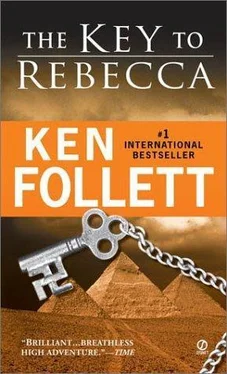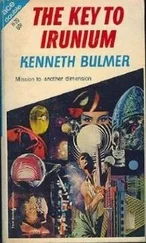Ken Follett - The Key to Rebecca
Здесь есть возможность читать онлайн «Ken Follett - The Key to Rebecca» весь текст электронной книги совершенно бесплатно (целиком полную версию без сокращений). В некоторых случаях можно слушать аудио, скачать через торрент в формате fb2 и присутствует краткое содержание. Жанр: Шпионский детектив, на английском языке. Описание произведения, (предисловие) а так же отзывы посетителей доступны на портале библиотеки ЛибКат.
- Название:The Key to Rebecca
- Автор:
- Жанр:
- Год:неизвестен
- ISBN:нет данных
- Рейтинг книги:4 / 5. Голосов: 1
-
Избранное:Добавить в избранное
- Отзывы:
-
Ваша оценка:
- 80
- 1
- 2
- 3
- 4
- 5
The Key to Rebecca: краткое содержание, описание и аннотация
Предлагаем к чтению аннотацию, описание, краткое содержание или предисловие (зависит от того, что написал сам автор книги «The Key to Rebecca»). Если вы не нашли необходимую информацию о книге — напишите в комментариях, мы постараемся отыскать её.
The Key to Rebecca — читать онлайн бесплатно полную книгу (весь текст) целиком
Ниже представлен текст книги, разбитый по страницам. Система сохранения места последней прочитанной страницы, позволяет с удобством читать онлайн бесплатно книгу «The Key to Rebecca», без необходимости каждый раз заново искать на чём Вы остановились. Поставьте закладку, и сможете в любой момент перейти на страницу, на которой закончили чтение.
Интервал:
Закладка:
The tall man stepped forward, shocked, and said, “My cousin!”
The traveler understood that this was not, after all, an illusion; and he smiled faintly and collapsed.
When he awoke he thought for a moment that he was a boy again, and that his adult life had been a dream.
Someone was touching his shoulder and saying, “Wake up, Achmed,” in the tongue of the desert. Nobody had called him Achmed for years. He realized he was wrapped in a coarse blanket and lying on the cold sand, his head swathed in a howli. He opened his eyes to see the gorgeous sunrise like a straight rainbow against the flat black horizon. The icy morning wind blew into his face. In that instant he experienced again all the confusion and anxiety of his fifteenth year.
He had felt utterly lost, that first time he woke up in the desert. He had thought, My father is dead, and then, I have a new father. Snatches from the Surahs of the Koran had run through his head, mixed with bits of the Creed which his mother still taught him secretly, in German. He remembered the recent sharp pain of his adolescent circumcision, followed by the cheers and rifle shots of the men as they congratulated him on at last becoming one of them, a true man. Then there had been the long train journey, wondering what his desert cousins would be like, and whether they would despise his pale body and his city ways. He had walked briskly out of the railway station and seen the two Arabs, sitting beside their camels in the dust of the station yard, wrapped in traditional robes which covered them from head to foot except for the slit in the howli which revealed only their dark, unreadable eyes. They had taken him to the well. It had been terrifying: nobody had spoken to him, except in gestures. In the evening he had realized that these people had no toilets, and he became desperately embarrassed. In the end he had been forced to ask. There was a moment of silence, then they all burst out laughing. It transpired that they had thought he could not speak their language, which was why everyone had tried to communicate with him in signs; and that he had used a baby word in asking about toilet arrangements, which made it funnier. Someone had explained to him about walking a little way beyond the circle of tents and squatting in the sand, and after that he had not been so frightened, for although these were hard men they were not unkind.
All these thoughts had run through his mind as he looked at his first desert sunrise, and they came back again twenty years later, as fresh and as painful as yesterday’s bad memories, with the words: “Wake up, Achmed.”
He sat up abruptly, the old thoughts clearing rapidly like the morning clouds. He had crossed the desert on a vitally important mission. He had found the well, and it had not been a hallucination: his cousins were here, as they always were at this time of the year. He had collapsed with exhaustion, and they had wrapped him in blankets and let him sleep by the fire. He suffered a sudden sharp panic as he thought of his precious baggage—had he still been carrying it when he arrived?—then he saw it, piled neatly at his feet.
Ishmael was squatting beside him. It had always been like this: throughout the year the two boys had spent together in the desert, Ishmael had never failed to wake first in the morning. Now he said: “Heavy worries, cousin.”
Achmed nodded. “There is a war.”
Ishmael proffered a tiny jeweled bowl containing water. Achmed dipped his fingers in the water and washed his eyes. Ishmael went away. Achmed stood up.
One of the women, silent and subservient, gave him tea. He took it without thanking her and drank it quickly. He ate some cold boiled rice while the unhurried work of the encampment went on around him. It seemed that this branch of the family was still-wealthy: there were several servants, many children and more than twenty camels. The sheep nearby were only a part of the flock—the rest would be grazing a few miles away. There would be more camels, too. They wandered at night in search of foliage to eat, and although they were hobbled they sometimes went out of sight. The young boys would be rounding them up now, as he and Ishmael had done. The beasts had no names, but Ishmael knew each one individually, and its history. He would say: “This is the bull my father gave to his brother Abdel in the year many women died, and the bull became lame so my father gave Abdel another and took this one back, and it still limps, see?” Achmed had come to know camels well, but he had never quite adopted the nomad attitude to them: he had not, he remembered, lit a fire underneath his dying white yesterday. Ishmael would have.
Achmed finished his breakfast and went back to his baggage. The cases were not locked. He opened the top one, a small leather suitcase; and when he looked at the switches and dials of the compact radio neatly fitted into the rectangular case he had a sudden vivid memory like a movie: the bustling frantic city of Berlin; a tree-lined street called the Tirpitzufer; a four-story sandstone building; a maze of hallways and staircases; an outer office with two secretaries; an inner office, sparsely furnished with desk, sofa, filing cabinet, small bed and on the wall a Japanese painting of a grinning demon and a signed photograph of Franco; and beyond the office, on a balcony overlooking the Landwehr Canal, a pair of dachshunds and a prematurely white-haired admiral who said: “Rommel wants me to put an agent into Cairo.”
The case also contained a book, a novel in English. Idly, Achmed read the first line: “ ‘Last night I dreamt I went to Manderley again.’ ” A folded sheet of paper fell out from between the leaves of the book. Carefully, Achmed picked it up and put it back. He closed the book, replaced it in the case, and closed the case.
Ishmael was standing at his shoulder. He said: “Was it a long journey?”
Achmed nodded. “I came from El Agela, in Libya.” The names meant nothing to his cousin. “I came from the sea.”
“From the sea!”
“Yes.”
“Alone?”
“I had some camels when I started.”
Ishmael was awestruck: even the nomads did not make such long journeys, and he had never seen the sea. He said: “But why?”
“It is to do with this war.”
“One gang of Europeans fighting with another over who shall sit in Cairo—what does this matter to the sons of the desert?”
“My mother’s people are in the war,” Achmed said.
“A man should follow his father.”
“And if he has two fathers?”
Ishmael shrugged. He understood dilemmas.
Achmed lifted the closed suitcase. “Will you keep this for me?”
“Yes.” Ishmael took it. “Who is winning the war?”
“My mother’s people. They are like the nomads—they are proud, and cruel, and strong. They are going to rule the world.”
Ishmael smiled. “Achmed, you always did believe in the desert lion.”
Achmed remembered: he had learned, in school, that there had once been lions in the desert, and that it was possible a few of them remained, hiding in the mountains, living off deer and fennec fox and wild sheep. Ishmael had refused to believe him. The argument had seemed terribly important then, and they had almost quarreled over it. Achmed grinned. “I still believe in the desert lion,” he said.
The two cousins looked at one another. It was five years since the last time they had met. The world had changed. Achmed thought of the things he could tell: the crucial meeting in Beirut in 1938, his trip to Berlin, his great coup in Istanbul ... None of it would mean anything to his cousin—and Ishmael was probably thinking the same about the events of his last five years. Since they had gone together as boys on the pilgrimage to Mecca they had loved each other fiercely, but they never had anything to talk about.
Читать дальшеИнтервал:
Закладка:
Похожие книги на «The Key to Rebecca»
Представляем Вашему вниманию похожие книги на «The Key to Rebecca» списком для выбора. Мы отобрали схожую по названию и смыслу литературу в надежде предоставить читателям больше вариантов отыскать новые, интересные, ещё непрочитанные произведения.
Обсуждение, отзывы о книге «The Key to Rebecca» и просто собственные мнения читателей. Оставьте ваши комментарии, напишите, что Вы думаете о произведении, его смысле или главных героях. Укажите что конкретно понравилось, а что нет, и почему Вы так считаете.












